Sometimes when traveling you have to learn to be independent. Sometimes you have to figure things out for yourself. Sometimes All the time, you really need coffee.
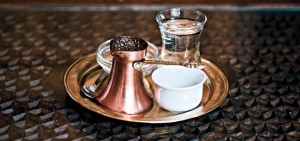
Traditionally, your kafa would be served in a lovely copper setup like this. While it may appear to be Turkish coffee, do not call it Turkish coffee. It is Bosnian coffee.
On this gray Sunday morning, the need was strong and the instant Nescafé just wasn’t going to cut it. But we all know that going down the street to the local cafe to get the good stuff requires a tremendous amount of steps, including, but not limited to, putting on real pants.
There are no Starbucks in Bosnia. Coffee never comes in any kind of paper, plastic, or otherwise disposable cup. Coffee is not fuel to get you through the day like an IV drip; it is meant to be sipped and enjoyed, preferably in the company of friends.
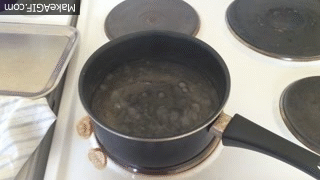
2. Put coffee grounds in a tiny metal pot. I am told the coffee here is different because its ground to be much finer. If you want to be really authentic, you can buy Bosnian coffee grounds online fairly inexpensively. Or you can just wing it with the stuff you already have.
Most Bosnians I’ve met don’t drink coffee out of the fancy copper sets like you will see in souvenir shops and traditional restaurants. This simple, small metal pot does the job and you can get one for much cheaper than any electric coffee maker on Amazon. Just put in a couple of scoops of coffee grounds (or three or four…)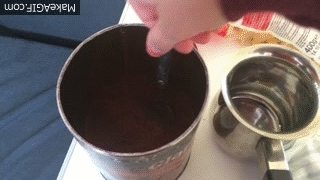
3. Pour boiling water into tiny metal pot with coffee grounds. Be extra careful if you’re holding your phone to take a video at the same time.
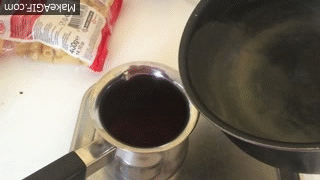
4. Put tiny metal pot back on stove. Ok, this is where the magic happens. It doesn’t need to be on there for long but you want to wait until you see some of these slow bubbles to know it’s ready. (Is that not the most beautiful thing you’ve ever seen?)
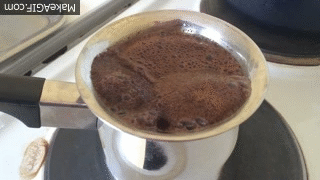
5. Scoop up the foam and put it in the bottom of your cup. I have no idea why we do this, but those are the rules.
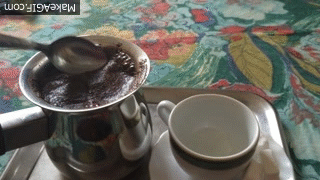
6. Pour into a cute, tiny cup, like so. A saucer with a couple of sugar cubes are good too.
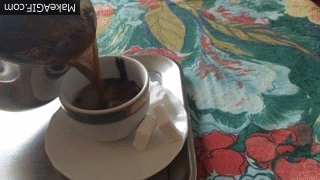
7. Try that first sip. You can add milk or sugar cubes. Nobody thinks you’re cool because you drink it black. If you want, you can dip a corner of a sugar cube in the coffee and then bite the sugar cube.

8. Realize the serving size you made is for like four people and do a happy dance. Now you have enough kafa to get you through the whole day and probably keep you up all night.

Ideally, this would be a social activity, but I am not ashamed to say I drank the whole thing myself.
Kafa is one of the most important aspects of Bosnian culture. Back home, a coffee break is running to the Starbucks on the corner and then heading straight back to the office to drink it while I work. In Bosnia, a coffee break is a real break. Everyone stops what they are doing, comes together, and talks (and not about work). If you’re interested in a how this tradition came to be, I recommend this article.
It wasn’t quite as good this time as it is when my BOSFAM friends make it, but learning new things is always exciting. I will be going up to Srebrenica tomorrow, so more serious blogs will follow but here’s a little reminder that life in post-conflict countries is not always doom and gloom. There are some little things that are really beautiful.
Posted By Sarah Reichenbach
Posted Jun 28th, 2015


5 Comments
Naki
June 28, 2015
This really made me laugh
Stephanie Lehman
June 29, 2015
I love your dance. So much. I’m going to to this as soon as I can
Clara
July 11, 2015
Get excited, Ebru has this in the apartment. She taught me how to tell fortunes with the grounds once!
Sarah Reichenbach
July 12, 2015
Yes!!! So great!
Susie
May 1, 2020
Hello!
When I lived in Bosnia for a while people who showed me how they made coffee told me they put the foam in the bottom of the cups so that the whole foam won’t fall in the first cup you serve. I guess it makes sense 🙂
They would also preheat the coffee grounds with some sugar (before adding the water), so it would be a little sweet and no sugar was added afterwards.
Of course even in the same country people have different ways to prepare it. Thanks for posting this, it brought me sweet memories from that lovely country <3